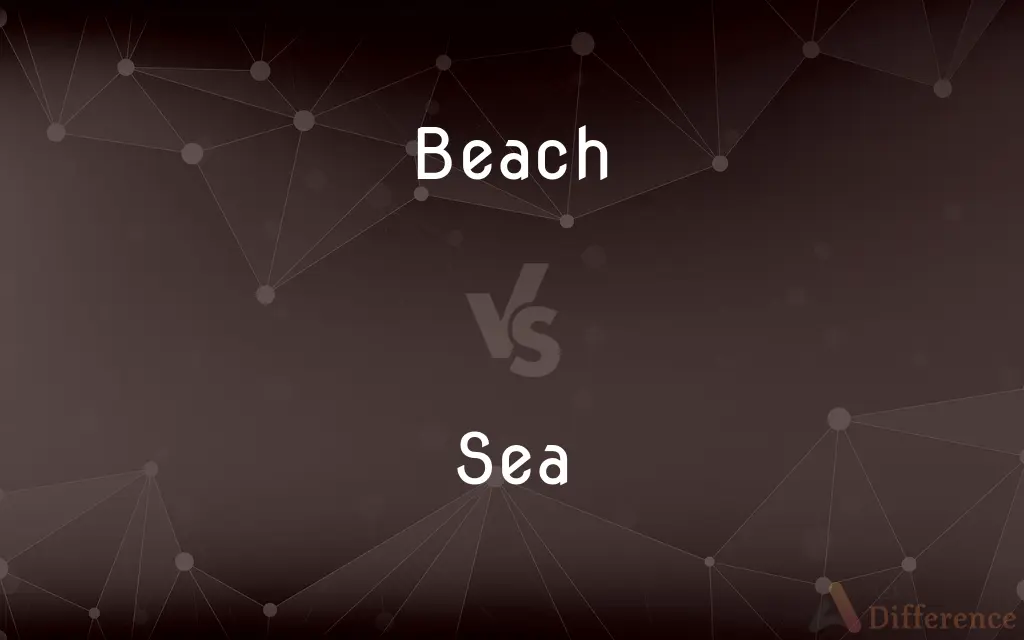Beach vs. Sea — What's the Difference?
By Urooj Arif & Fiza Rafique — Updated on March 21, 2024
Beaches are sandy shores lining the edge of a landmass, known for relaxation and recreational activities, while seas are vast bodies of saltwater, larger than lakes but part of the world's oceans.

Difference Between Beach and Sea
Table of Contents
ADVERTISEMENT
Key Differences
Beaches are characterized by their sandy or pebbly shores along the edges of land, offering a place for recreational activities, sunbathing, and swimming. Whereas, seas are large bodies of saltwater, enclosed by land partially, playing a crucial role in the earth's ecosystem and climate regulation.
Beaches serve as natural barriers protecting the inland areas from erosion and storms, acting as buffers against the force of waves. On the other hand, seas contribute significantly to the global climate system by storing carbon dioxide and regulating temperatures, thereby affecting weather patterns worldwide.
While beaches provide habitats for a variety of land and marine species, facilitating biodiversity near coastlines, seas host a vast array of marine life, from microscopic plankton to the largest whales, supporting rich marine ecosystems.
Beaches are often central to local economies through tourism, attracting millions of visitors seeking leisure and recreational activities. In contrast, seas are vital for international trade, with ships navigating across them to transport goods between countries.
The experience of visiting a beach is typically marked by relaxation and recreational activities such as swimming, sunbathing, and playing sports. Whereas, exploring the sea involves activities like sailing, fishing, and deep-sea diving, offering a different kind of adventure and interaction with marine life.
ADVERTISEMENT
Comparison Chart
Definition
Sandy or pebbly shorelines along the edge of a landmass.
Large bodies of saltwater, part of the world's oceans, enclosed by land partially.
Purpose
Recreation, tourism, protection from erosion.
Climate regulation, marine biodiversity, international trade.
Activities
Sunbathing, swimming, beach sports.
Sailing, fishing, deep-sea diving.
Ecosystem
Supports land and some marine species, promotes biodiversity near coastlines.
Hosts a wide range of marine life, crucial for marine ecosystems.
Economic Role
Tourism-driven, attracting visitors for leisure.
Crucial for international trade and maritime activities.
Compare with Definitions
Beach
Beaches are known for their sand or pebbles, calm waves, and recreational facilities.
The beach's fine white sand and clear waters make it a popular destination.
Sea
A sea is a large body of saltwater surrounded in whole or in part by land.
The Mediterranean Sea is a popular route for maritime trade.
Beach
Beaches serve as habitats for various species and act as buffers protecting inland areas from erosion.
The beach ecosystem supports both land and marine life, including nesting turtles.
Sea
Seas are larger than lakes and are important for climate regulation and marine biodiversity.
The sea's vast waters play a critical role in the global climate system.
Beach
A beach is a narrow, gently sloping strip of land that lies along the edge of an ocean, sea, or lake.
The beach was filled with tourists enjoying the sun.
Sea
Seas host diverse marine ecosystems, from plankton to whales.
The sea is home to coral reefs teeming with life.
Beach
Beaches boost local economies through tourism and related businesses.
The local economy thrives on beach tourism, with hotels and restaurants flourishing.
Sea
Activities include sailing, fishing, and deep-sea exploration.
He spends his weekends sailing on the sea.
Beach
They are popular destinations for swimming, sunbathing, and surfing.
Many people visit the beach during the summer to relax and participate in water sports.
Sea
Seas are crucial for international trade and maritime activities.
The sea routes are essential for transporting goods between continents.
Beach
A beach is a landform alongside a body of water which consists of loose particles. The particles composing a beach are typically made from rock, such as sand, gravel, shingle, pebbles, etc., or biological sources, such as mollusc shells or coralline algae.
Sea
The sea, connected as the world ocean or simply the ocean, is the body of salty water that covers approximately 71 percent of the Earth's surface. The word sea is also used to denote second-order sections of the sea, such as the Mediterranean Sea, as well as certain large, entirely landlocked, saltwater lakes, such as the Caspian Sea.
Beach
A pebbly or sandy shore, especially by the sea between high- and low-water marks
Fabulous sandy beaches
Sea
The continuous body of salt water covering most of the earth's surface, especially this body regarded as a geophysical entity distinct from earth and sky.
Beach
Run or haul up (a boat or ship) on to a beach
At the water's edge a rowing boat was beached
Sea
A tract of water within an ocean.
Beach
The shore of a body of water, especially when sandy or pebbly.
Sea
A relatively large body of salt water completely or partially enclosed by land.
Beach
The sand or pebbles on a shore.
Sea
A relatively large landlocked body of fresh water.
Beach
The zone above the water line at a shore of a body of water, marked by an accumulation of sand, stone, or gravel that has been deposited by the tide or waves.
Sea
The condition of the ocean's surface with regard to its course, flow, swell, or turbulence
A rising sea.
Choppy seas.
Beach
To run, haul, or bring ashore
Beached the rowboat in front of the cabin.
Hooked a big bluefish but was unable to beach it.
Sea
A wave or swell, especially a large one
A 40-foot sea that broke over the stern.
Beach
To cause (a whale or other sea animal) to be unable to swim free from a beach.
Sea
Something that suggests the ocean in its overwhelming sweep or vastness
A sea of controversy.
Beach
To run or be hauled ashore
We beached near the palm trees.
Sea
Seafaring as a way of life.
Beach
To be stranded on a beach. Used of sea animals.
Sea
(Astronomy) A lunar mare.
Beach
The shore of a body of water, especially when sandy or pebbly.
Sea
A large body of salt water.
Beach
A horizontal strip of land, usually sandy, adjoining water.
Sea
The ocean; the continuous body of salt water covering a majority of the Earth's surface.
Beach
The loose pebbles of the seashore, especially worn by waves; shingle.
Sea
A body of salt water smaller than an ocean, generally forming part of, or connecting with, an ocean or a larger sea.
The Mediterranean Sea, the Caribbean Sea, the Sea of Crete, etc.
Beach
Synonym of gravel trap
Sea
A lake, especially if large or if salty or brackish.
The Caspian Sea, the Sea of Galilee, the Salton Sea, etc.
Beach
(sports) A dry, dusty pitch or situation, as though playing on sand.
Sea
The swell of the sea; a single wave; billow.
Beach
(intransitive) To run aground on a beach.
Sea
Living or used in or on the sea; of, near, or like the sea.
Seaman, sea gauge, sea monster, sea horse, sea level, seaworthy, seaport, seaboard, etc.
Beach
(transitive) To run (something) aground on a beach.
Sea
(figurative) Anything resembling the vastness or turbulence of the sea.
Beach
(of a vehicle) To run into an obstacle or rough or soft ground, so that the floor of the vehicle rests on the ground and the wheels cannot gain traction.
Sea
(physics) A constant flux of gluons splitting into quarks, which annihilate to produce further gluons.
Beach
Pebbles, collectively; shingle.
Sea
(planetology) A large, dark plain of rock; a mare.
The Apollo 11 mission landed in the Sea of Tranquility.
Beach
The shore of the sea, or of a lake, which is washed by the waves; especially, a sandy or pebbly shore; the strand.
Sea
(planetology) A very large lake of liquid hydrocarbon.
Beach
To run or drive (as a vessel or a boat) upon a beach; to strand; as, to beach a ship.
Sea
One of the larger bodies of salt water, less than an ocean, found on the earth's surface; a body of salt water of second rank, generally forming part of, or connecting with, an ocean or a larger sea; as, the Mediterranean Sea; the Sea of Marmora; the North Sea; the Carribean Sea.
Beach
An area of sand sloping down to the water of a sea or lake
Sea
An inland body of water, esp. if large or if salt or brackish; as, the Caspian Sea; the Sea of Aral; sometimes, a small fresh-water lake; as, the Sea of Galilee.
Beach
Land on a beach;
The ship beached near the port
Sea
The ocean; the whole body of the salt water which covers a large part of the globe.
I marvel how the fishes live in the sea.
Ambiguous between sea and landThe river horse and scaly crocodile.
Sea
The swell of the ocean or other body of water in a high wind; motion or agitation of the water's surface; also, a single wave; a billow; as, there was a high sea after the storm; the vessel shipped a sea.
Sea
A great brazen laver in the temple at Jerusalem; - so called from its size.
He made a molten sea of ten cubits from brim to brim, round in compass, and five cubits the height thereof.
Sea
Fig.: Anything resembling the sea in vastness; as, a sea of glory.
All the space . . . was one sea of heads.
Sea
A division of an ocean or a large body of salt water partially enclosed by land
Sea
Anything apparently limitless in quantity or volume
Sea
Turbulent water with swells of considerable size;
Heavy seas
Sea
Relating to or characteristic of or occurring on the sea or ships;
Sea stories
Sea smells
Sea traffic
Land vehicles
Common Curiosities
Can you find beaches in seas?
Yes, beaches can be found along the edges of seas, where the sea meets the land.
Is swimming possible in both beaches and seas?
Swimming is popular at beaches due to the gentle waves and shallower waters, while seas can also be suitable for swimming, depending on the location and conditions.
Are seas saltier than beaches?
Seas contain saltwater, making them saltier than the freshwater or the sand found at beaches.
Are there any economic activities unique to beaches?
Beaches are hubs for tourism-related businesses, such as hotels, restaurants, and recreational services, which are less prevalent in open sea areas.
What is the primary difference between a beach and a sea?
A beach is a narrow landform along the edge of a sea or ocean, primarily known for sand and recreational activities, while a sea is a large body of saltwater that is part of the ocean, playing a key role in the earth's ecosystems and climate.
Are all beaches sandy?
Not all beaches are sandy; some have pebbles, rocks, or shingle, depending on the geological conditions and wave action.
How do beaches and seas affect the local climate?
Beaches can influence local weather patterns by affecting temperature and humidity levels, while seas play a crucial role in regulating global climate through the storage of carbon dioxide and heat distribution.
Which is more important for tourism, beaches or seas?
Beaches are typically more important for tourism, offering recreational activities and scenic views, though seas also attract tourists for activities like sailing and deep-sea fishing.
What are some conservation efforts for beaches and seas?
Conservation efforts include protecting marine life, regulating fishing, reducing pollution, and preserving natural habitats both on beaches and in seas.
Do both beaches and seas support marine life?
Beaches provide habitats for certain marine life, especially near the shore, whereas seas support a vast array of marine ecosystems throughout their depths.
How do human activities impact beaches and seas differently?
Human activities can lead to pollution and habitat destruction on beaches, while seas face issues like overfishing, marine pollution, and the effects of climate change.
Can the term "sea" refer to any body of saltwater?
While any large body of saltwater can be called a sea, the term typically refers to larger areas partially enclosed by land or distinct parts of the ocean.
How does the biodiversity of beaches compare to that of seas?
Beaches support a specific range of species adapted to the shoreline environment, while seas have a broader and more diverse range of marine life throughout their depths.
Can the ecosystem of a beach change over time?
Yes, the ecosystem of a beach can change due to natural processes like erosion and human activities such as development and pollution.
What role do seas play in global trade?
Seas are essential for global trade, serving as major routes for shipping goods between countries and continents.
Share Your Discovery

Previous Comparison
Anarchy vs. Chaos
Next Comparison
Know vs. KnowsAuthor Spotlight
Written by
Urooj ArifUrooj is a skilled content writer at Ask Difference, known for her exceptional ability to simplify complex topics into engaging and informative content. With a passion for research and a flair for clear, concise writing, she consistently delivers articles that resonate with our diverse audience.
Co-written by
Fiza RafiqueFiza Rafique is a skilled content writer at AskDifference.com, where she meticulously refines and enhances written pieces. Drawing from her vast editorial expertise, Fiza ensures clarity, accuracy, and precision in every article. Passionate about language, she continually seeks to elevate the quality of content for readers worldwide.














































